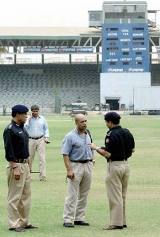World's apart
England tours of the subcontinent have often been a story of closed hotel doors and closed minds. With a trip to Pakistan forthcoming, Mihir Bose investigates whether anything has changed
|
|

|
For a visitor unused to the ways of the subcontinent this may have appeared bewildering. The Australian tour of India was long over. Waugh, who had retired before the tour, had not been part of that victorious team, the first from Australia since 1969-70 to win a series in India.
But it did not take long to learn that this was part of a long-term association with India, which had started with cricket but expanded far beyond. Here was a sportsman who feels strongly that he has something to give. His meeting with the chief minister was to discuss plans to help set up projects to promote education among the city's needy children. Waugh, when he had toured India as Australia's captain, had made a point of taking his team to visit Mother Theresa.
Nor is Waugh unique among Australian cricketers. Shane Warne and Brett Lee go often to India and all three are so well known and popular that advertisers there use them to promote their products to Indian consumers. Lee's image has been used to help sell insurance on the subcontinent and he has even picked up a few words of Punjabi and Hindi.
These Australians have all found the key to the sporting heart of the subcontinent. People are passionate about their sports, particularly cricket, but they are not xenophobic. It is not unusual for sports pages of the subcontinent to lead with stories about English domestic cricket or Premiership football and, if a sportsman of any country takes to India, then India responds generously.
We can be pretty sure that England's tour of Pakistan this autumn will see no such happy interaction. The tour will be seen as a grim and necessary duty. It will go ahead despite the unease many English cricketers feel, an unease boosted by the terror campaign in London which involved British Muslims tutored in Pakistan. Though the tour has not been discussed collectively by the English players, a few will almost certainly drop out citing security.
The precedent here is the one set for the tour of India in the winter of 2001-02, in the immediate aftermath of September 11, when after much agonising the trip went ahead but with three doubters - Andrew Caddick, Robert Croft and Alec Stewart - given special leave of absence. David Morgan, the chairman of the ECB, has made it clear that such cricketers will not be penalised.
English players who are feeling uneasy can justifiably point to the Foreign and Commonwealth Office travel advisory on Pakistan. This reads: "There is a high threat from terrorism throughout Pakistan. British nationals of Western origin are more likely to be targeted, but everyone is at risk from indiscriminate attacks. Previous attacks against Westerners have included bombings and kidnaps. There is a high risk of sectarian violence throughout Pakistan. We recommend that you avoid places of worship and surrounding areas at busy prayer times. There is also a serious risk of criminal violence, especially in Karachi. You should be very careful about, and confident of, your personal security arrangements throughout your visit."
A visitor to Barbados or even gun-ridden Jamaica would find no such warning. But beyond security there remains the continuing failure by English players to develop any personal relations with the subcontinent's cricketers, despite this country's long association with the region.
This was most evident during the 2001-02 tour of India. The England squad, on their visit to Hyderabad, were invited by Mohammad Azharuddin to have dinner at his home. Only four of them, all of Asian origin, went. The rest remained in the hotel. Indeed so incurious were they of this city, which has a magnificent history and is now helping lead India's high-tech revolution, that apart from the necessary visits to the cricket stadium they did not leave their hotel.
Naynesh Desai, the Asian-born lawyer who acts for Ian Botham and several other players, recalls: "I was struck by this during the 1992-93 Graham Gooch tour of India. The tour was a cricketing disaster for England and it was only the three black cricketers - Dev Malcolm, Phil DeFreitas and Chris Lewis - who were interested in venturing out. As a result of that I met Devon and started acting for him. The others rarely went beyond hotel bars or discos. India just did not engage them."
Curiously two retired English greats, Geoffrey Boycott and Ian Botham, frequently visit India now and Boycott, once a pariah for his South African connections, is close to Sourav Ganguly and such a television star that Indians love to mimic his Yorkshire accent.
"The ECB should sit down with the subcontinental boards," Desai says, "and organise programmes which can engage the English touring parties. For instance, when they go to Adelaide they always visit the vineyards; nothing like that is ever organised in India and the cricketers find the official receptions dull and unbearable." But, with the ECB seeing cricket tours to the subcontinent only as a necessary part of the economics of the game, such initiatives are unlikely.
Mihir Bose is a sports writer for the Daily Telegraph
